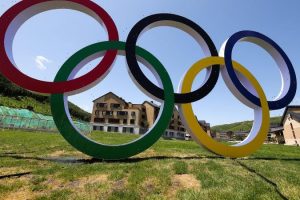Japanese foreign affairs chair wants more pressure on Beijing 2022

The chair of Japan’s foreign affairs committee says Tokyo should continue to pressure Beijing over ongoing human rights violations while China prepares to host the 2022 Winter Olympics.
The comments are the first from a senior Japanese government MP on Beijing’s suitability to host the Games and come at a sensitive time between the two neighbours and Olympic hosts.
People take selfies in front of a display showing a countdown clock to the 2022 Winter Olympics in Beijing.Credit:AP
The Paralympics in Tokyo will begin on Tuesday, while Beijing’s Winter Games in February are less than six months away.
“Japan has serious concerns about human rights violations in the Xinjiang Uighur Autonomous Region, the reason why the US and UK are calling for a diplomatic boycott of the Beijing Olympics,” Makoto Nagamine told The Age and The Sydney Morning Herald in Tokyo.
“Japan should continue working to strongly push China regarding human rights issues, together with the US and other related countries. I believe Japan should continue working closely with the international community to put pressure on China over this issue.”
Makoto Nagamine wants the international community to keep pressure on Beijing over human rights.
Japanese leaders have historically been reluctant to publicly rebuke their superpower neighbour, particularly while both countries are under the international Olympic spotlight, but the comments from Nagamine show concerns within the parliament, or Diet, have spread beyond national security hawks and members of the Inter-Parliamentary Alliance on China – an international group of about 200 MPs.
China has been accused of genocide in Xinjiang, where up to 1 million Uighurs have been detained in what it calls re-education camps. It has also crushed activists, political opposition and independent media in Hong Kong, forced Tibetan dissidents into forced labour camps and threatened Taiwan.
Nagamine stopped short of backing a diplomatic boycott but accused China of behaving in a way that was “inconsistent with international law” along its borders. The 52-year-old said Taiwan should join the World Health Assembly and that Hong Kong was an “extremely important partner to Japan” that should have its liberty maintained.
Tokyo too faced protests during the Olympics that finished on August 9 over the impact of the Games on soaring coronavirus infections which have now reached 20,000 per day. It has also come under international scrutiny over the treatment of hundreds of foreign parents who say their children have been abducted by their Japanese partners.
Aware of the ongoing public backlash and falling approval ratings, Japanese government ministers have been keen to limit links between politics and the Olympics.
“We don’t think that the Olympics should be used for political purposes,” Japanese Defence Minister Nobuo Kishi said in a separate interview with this masthead in Tokyo. “With respect to our relations with China, whatever concerns that we have, we make a point of frankly conveying to them.”
Japanese Defence Minister Nobuo Kishi.Credit:Viola Kam
But the Suga government faces a groundswell of both local and international pressure to take a tougher stand on China’s human rights record as the Canadian, US, British and Australian legislatures debate whether to send any official representation to the Beijing Games.
Australia has yet to decide whether it will send Sports Minister Richard Colbeck. The Coalition government had been wary of provoking a further Olympic backlash from China before Brisbane had locked in the 2032 Games in Tokyo in July, government sources with knowledge of the negotiations said.
Officials provide a construction update on the Beijing Winter Olympics venues.Credit:Getty Images
If Colbeck were to travel as the official representative he would be the first Australian minister to travel to China in more than two years after a diplomatic breakdown with China over human rights and national security disputes.
Beijing has spent billions of dollars building up its facilities across the north-east of the country as it turns the Winter Games into a showcase of its economic, technical and athletic achievements.
China’s President Xi Jinping has pledged to get more than 300 million people on the snow, a pursuit historically seen as too expensive for its population. The number of ski resorts has doubled since Beijing won the bid in 2015. One area, Chongli, was officially lifted out of poverty in May 2019, according to Chinese state media after nearly 30,000 people out of its 126,000 population were employed by ski resorts or related companies.
But China is now also preparing to host an Olympics with even stricter regulations than Tokyo due to the Delta coronavirus variant, new outbreaks in areas previously vaccinated by China’s Sinovac vaccine and the risk of human rights concerns being highlighted by spectators and foreign media.
The zero-tolerance approach to COVID-19 outbreaks could see foreign spectators banned, limited official attendance and restrictions placed on travel, media and interaction with locals.
“[It will be] a simple, safe and splendid Olympic gathering,” China’s Foreign Ministry said in July.
Get a note direct from our foreign correspondents on what’s making headlines around the world. Sign up for the weekly What in the World newsletter here.
Most Viewed in World
From our partners
Source: Read Full Article




